第九讲 名词性从句
名词性从句讲解(最全版)
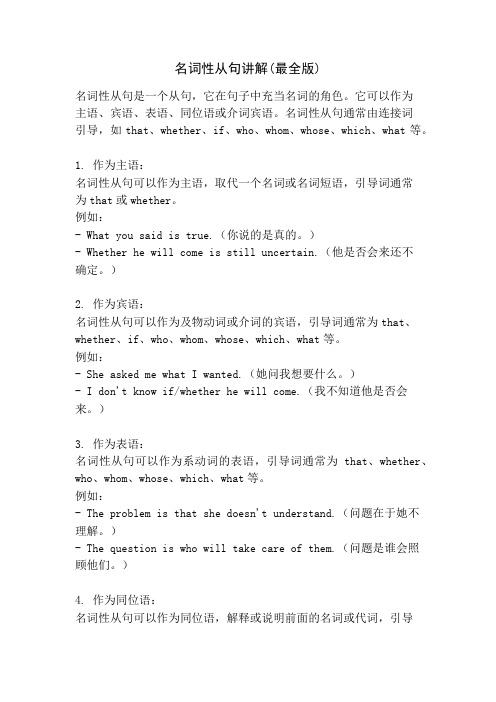
名词性从句讲解(最全版)名词性从句是一个从句,它在句子中充当名词的角色。
它可以作为主语、宾语、表语、同位语或介词宾语。
名词性从句通常由连接词引导,如that、whether、if、who、whom、whose、which、what等。
1. 作为主语:名词性从句可以作为主语,取代一个名词或名词短语,引导词通常为that或whether。
例如:- What you said is true.(你说的是真的。
)- Whether he will come is still uncertain.(他是否会来还不确定。
)2. 作为宾语:名词性从句可以作为及物动词或介词的宾语,引导词通常为that、whether、if、who、whom、whose、which、what等。
例如:- She asked me what I wanted.(她问我想要什么。
)- I don't know if/whether he will come.(我不知道他是否会来。
)3. 作为表语:名词性从句可以作为系动词的表语,引导词通常为that、whether、who、whom、whose、which、what等。
例如:- The problem is that she doesn't understand.(问题在于她不理解。
)- The question is who will take care of them.(问题是谁会照顾他们。
)4. 作为同位语:名词性从句可以作为同位语,解释或说明前面的名词或代词,引导词通常为that、whether、who、whom、whose、which、what等。
例如:- The fact that he lied surprised me.(他撒谎的事实让我感到惊讶。
)- His belief that she will succeed is unwavering.(他坚信她会成功。
名词性从句ppt

名词性从句1. 什么是名词性从句名词性从句是指在句子中充当名词的从句。
它可以作主语、宾语、表语、同位语等成分,起着名词的作用。
名词性从句通常由连接词引导,常见的引导词有:that、whether、if、who、whom、whose、which、what等。
2. 名词性从句的类型名词性从句有三种类型:主语从句、宾语从句和同位语从句。
2.1 主语从句主语从句是指在句子中作主语的名词性从句。
它通常由连接词“that”引导,也可以由连接词“whether/if”引导。
主语从句在句子中起到主语的作用,常见的句型有:•That he is late is a problem.(他迟到是个问题。
)•Whether/if it will rain tomorrow is uncertain.(明天是否会下雨还不确定。
)2.2 宾语从句宾语从句是指在句子中作宾语的名词性从句。
它通常由连接词“that”引导,宾语从句常见的动词有:believe、think、know、hope、wonder、ask等。
宾语从句在句子中起到宾语的作用,常见的句型有:•I believe that he is telling the truth.(我相信他在说真话。
)•She asked me if I could help her.(她问我是否能帮她。
)2.3 同位语从句同位语从句是指在句子中作同位语的名词性从句。
它通常由连接词“that”引导,同位语从句一般紧跟在名词之后,用来解释说明该名词的内容。
常见的句型有:•The news that he won the prize is exciting.(他获奖的消息令人激动。
)•I have no idea that he is coming.(我不知道他要来。
)3. 名词性从句的注意事项在使用名词性从句时,需要注意以下几点:•引导词的选择:根据具体语境选择合适的引导词,如主语从句通常使用“that”;宾语从句中的直接引语常用“that”,间接引语用“whether/if”。
名词性从句解读

名词性从句解读名词性从句是英语语法中的一种重要结构,它在句子中担任名词的作用。
在本文中,我们将探讨名词性从句的概念、分类以及使用方法,帮助读者更好地理解和运用名词性从句。
一、名词性从句的概念名词性从句,顾名思义,是指在句子中可以担任名词功能的从句。
它与名词一样,可以在句子中作主语、宾语、表语、同位语等。
名词性从句主要有三种类型:主语从句、宾语从句和表语从句。
1. 主语从句主语从句在句子中作主语,常由连接词“that”引导。
例如:- That he is late makes me angry.(他迟到了让我生气。
)- Whether she can come is still uncertain.(她能否来还不确定。
)2. 宾语从句宾语从句在句子中作及物动词的宾语,常由引导词“that”或“whether/if”引导。
例如:- He asked whether/if I could help him.(他问我能否帮他。
)- I believe that he will succeed.(我相信他会成功。
)3. 表语从句表语从句在句子中作表语,常由引导词“that”或“whether/if”引导。
例如:- The problem is that we don't have enough time.(问题在于我们没有足够的时间。
)- My concern is whether/if he understands the importance of this project.(我的担忧是他是否理解这个项目的重要性。
)二、名词性从句的使用方法名词性从句可以使句子更加丰富、灵活,同时也能够避免重复使用某些词语。
以下是使用名词性从句的一些常见方法:1. 引导词的选择名词性从句的引导词有很多,如“that”、“whether/if”、“what”、“who”、“why”等。
在选择引导词时,需要根据具体语境和从句的功能来确定。
初中英语知识点归纳名词性从句和名词性从句的用法区别

初中英语知识点归纳名词性从句和名词性从句的用法区别名词性从句是英语语法中的一个重要部分,它充当名词的作用。
名词性从句分为名词性从句和名词性从句的用法区别。
一、名词性从句的概念和特点名词性从句是一种从句,它在句中担任名词的角色。
名词从句可以作主语、宾语、表语和同位语等。
名词性从句的特点是:1. 由连接词that、whether/if, who, whom, whose, what, which等引导。
2. 可以在主句中作主语、宾语、表语和同位语等。
3. 名词从句不可以独立存在,依附于主句成分的分量。
4. 名词从句既可以作状语,也可以作宾补,修饰动词、形容词或副词。
二、名词性从句的用法1. 名词性从句作主语例如:What you said is true.(你所说的是真的。
)2. 名词性从句作宾语例如:I know that he is a doctor.(我知道他是医生。
)3. 名词性从句作表语例如:My dream is that I can travel around the world.(我的梦想是能环游世界。
)4. 名词性从句作同位语例如:The news that he won the competition made me excited.(他赢得比赛的消息让我兴奋。
)三、名词从句的用法区别名词性从句分为两种:名词性从句和名词性从句。
1. 名词性从句用于陈述句和一般疑问句中,用连接词that引导;而名词性从句多用于特殊疑问句中,用连接词what, which, who, whom, whose等引导。
例如:That he passed the exam pleased his parents.(他通过了考试使他的父母高兴。
)What he said surprised us.(他说的话让我们惊讶。
)2. 名词性从句用于陈述句时,从句中的谓语动词用陈述语气;而名词性从句在特殊疑问句中,从句中的谓语动词用疑问语气。
名词性从句解析
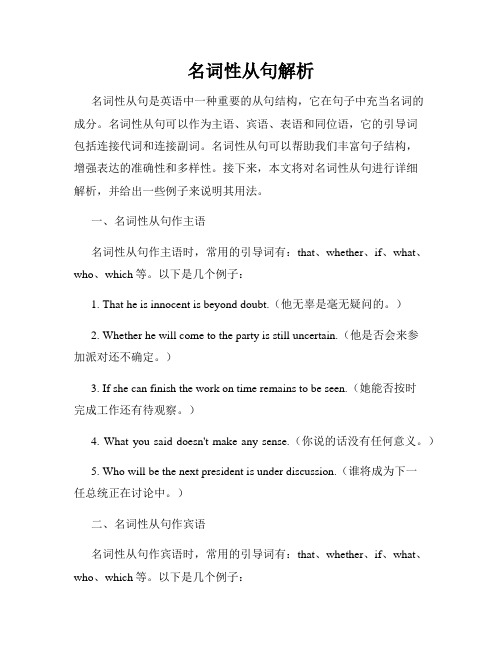
名词性从句解析名词性从句是英语中一种重要的从句结构,它在句子中充当名词的成分。
名词性从句可以作为主语、宾语、表语和同位语,它的引导词包括连接代词和连接副词。
名词性从句可以帮助我们丰富句子结构,增强表达的准确性和多样性。
接下来,本文将对名词性从句进行详细解析,并给出一些例子来说明其用法。
一、名词性从句作主语名词性从句作主语时,常用的引导词有:that、whether、if、what、who、which等。
以下是几个例子:1. That he is innocent is beyond doubt.(他无辜是毫无疑问的。
)2. Whether he will come to the party is still uncertain.(他是否会来参加派对还不确定。
)3. If she can finish the work on time remains to be seen.(她能否按时完成工作还有待观察。
)4. What you said doesn't make any sense.(你说的话没有任何意义。
)5. Who will be the next president is under discussion.(谁将成为下一任总统正在讨论中。
)二、名词性从句作宾语名词性从句作宾语时,常用的引导词有:that、whether、if、what、who、which等。
以下是几个例子:1. He knows that I am telling the truth.(他知道我说的是真话。
)2. I'm not sure whether it will rain tomorrow.(我不确定明天是否会下雨。
)3. I wonder if he has received my email.(我想知道他是否收到了我的电子邮件。
)4. Please tell me what you want for dinner.(请告诉我你想要吃什么晚餐。
2013年《高考风向标》高考英语一轮复习课件 第二部分 第九讲 名词性从句
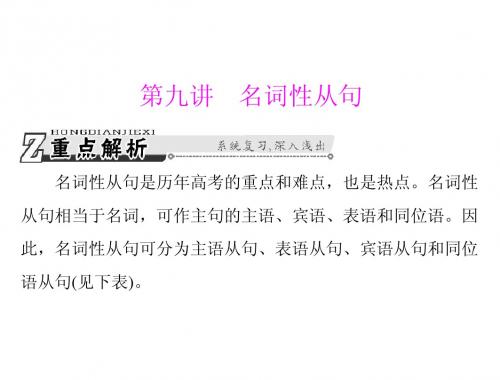
主语从句
It is/has been+过 去分词+主语从句
proved that...已证实„„/It is said that...据
说„„
2.主语从句不可位于句首的五种情况
例句 It's unknown whether/if he will come.(正) if 引导的主语从句不可 Whether he will come or not is unknown.(正) 位于复合句句首 If he will come or not is unknown.(误) It is said/reported...结构 It is said that Jiang will visit our school.(正) 中的主语从句不可提前 Jiang will visit our school next week is said.(误) It happens/occurs...结构 中的主语从句不可提前 It doesn't matter how/ whether...结构中的主语 从句不可提前 It occurred to him that he failed in the examination.(正) That he failed in the examination occurred to him.(误) 说明
The reason why he is late for school is that he missed the early bus.他上学迟到的原因是他错过了早班车。
四、同位语从句 同位语从句是在复合句中作同位语的名词性从句。
说明 同位语从句的功能 (一般由 that 引导, that 不作句子成分, 但也不可省略) 例句 The king's decision that the prisoner 对于名词进一 would be set free surprised all the people.国王做出释放那个罪犯的 步解释 决定让所有人都很吃惊。 The order that all the soldiers should 说明名词的具 stay still was given by the gene-ral. 所有的士兵都应该保持不动,这 体内容 个命令是将军下的。 有时可以不紧 He got the news from Mary that the 跟在它所说明 sports meeting was put off.他从玛 的名词后面, 莉那里得到消息——运动会被推 被别的词隔开 迟了。
英语名词性从句讲解【完整版】

2、I asked him if he could do me a favor .
If与whether的区别:
1、If不能引导放于句首的主语从句,而whether可以。 2、引导表语从句用whether,不用if。 3、引导同位语从句用whether,不用if。 4、whether可以引导从句作介词的宾语,不用if 。 5、whether or not 连在一起可以,但if不可以。而 “whether-----or not = if -----or not”
同位语从句:
定义:在复合句中充当同位语的句子。 同位语从句用来对其前面的抽象名词进行解释说明,被解释说明的词和 同位语在逻辑上是主表关系。 同位语常见名词:fact, suggestion, advice, idea, decision, news, thought, hope, belief, truth, doubt, promise, possibility, truth, warning, message, reason, report, question,explanation, wish, problem等。 常见的连接词:that, whether, what, who, how, when, where等。 用法: The thought that I want to buy my mother a birthday gift makes me excited.that 引导的同位语从句,解释说明 thought,从句不缺成 分 There is some doubt whether he will come. whether 引导同位语从句,if 不能引导同位语从句 we haven’t made the decision where we are going to spend our vacation. 有时同位语从句可以不紧跟解释说明的名词后面。 The news is surprising that he won the match.
2022高考人教版英语复习学案依据句子成分和结构突破名词性从句含答案

第九讲依据句子成分和结构突破名词性从句1.(2020·浙江7月高考)Over thousands of years, they began to depend less on could be hunted or gathered from the wild, and more on animals they had raised and crops they had sown.解析:what分析句子结构可知,介词on后是宾语从句,从句中缺少主语,且表示“……的事物”,应用what引导。
2.(2019·全国卷Ⅰ)While they are rare north of 88°,there is evidence they range all the way across the Arctic, and as far south as James Bay in Canada.解析:that分析句子结构可知,设空处引导同位语从句,解释说明evidence的内容,从句中不缺少成分且意义完整,故填that。
3.(2018·浙江11月高考)It is possible caffeine may cause birth defects (缺陷) in humans, too.解析:that分析句子结构可知,该句是一个主从复合句,it作形式主语,真正的主语是设空处引导的从句,故填that。
4.(2018·全国卷Ⅲ)I'm not sure is more frightened, me or the female gorilla (大猩猩) that suddenly appears out of nowhere.解析:who分析句子结构可知,空格处作从句的主语,根据后面的“me or the female gorilla”可知,作者把自己和大猩猩作对比,表示“我不知道我和大猩猩谁更害怕”,故填who。
名词性从句讲解课件

02 功能
用于引导主语从句、宾语从句、表语从句和同位 语从句。
03 例子
The news that he passed the exam was unexpected.(他通过考试的消息是出人意料 的。)
whether的用法
01
02
03
定义
whether用作引导词,在 名词性从句中充当成分, 表示“是否”。
功能
用于引导主语从句、宾语 从句、表语从句和同位语 从句。
例子
I don't know whether he will come or not. (我不知道他是否会来。)
who/whom/whose的用法
定义
who/whom/whose用作 引导词,在名词性从句中 充当成分,表示“谁”。
as引导的让步状语从句
总结词
表示转折关系
详细描述
as可以引导让步状语从句,表示“尽管、虽然”的意思。这种从句通常出现在主句之前,用于 强调从句中的内容。
than引导的比较状语从句
总结词
表示比较关系
详细描述
than可以引导比较状语从句,表示“比...更...”的意思。这种从句通常出现在主 句之后,用于强调两者之间的差异或优劣。
被动语态
表示主语是动作的接受者。例如:“It was said that the book would be published next year.”
时态与语态的结合使用
现在进行时的被动语态
表示正在被进行的动作或存在的状态。例如: “We are being told that the game is about to start.”
新教材高三英语二轮复习语法专项提升9

可 能 得 到 的 帮 助 。 whatever 在 此 修 饰 help , 意 为 “ 无 论 什
么”,而其他三个选项,不作形容词,不能修饰名词,故排
除。
答案: A
工具
语法专项提升
栏目导引
2.(2012·宁夏银川调研)She is very dear to us.We have
been prepared to do it takes to save her life.
A.that
B.how
C.why
D.whether
解析: 考查名词性从句。从句I could work with my
roommat Tim句意完整,不缺少成分,因此使用that引导同位语
从句,解释说明idea的内容。
答案: A
工具
语法专项提升
栏目导引
3.(2012·河南省洛阳市检测)All of Manhattan,parts of
整,故用that引导。
答案: D
工具
语法专项提升
栏目导引
2.(2012·辽宁六校模拟)—How are you getting along with
your project?
—I was about to give up when an idea occurred to me
I
could work with my roommate Tim.
China is no longer what she used to be. 中国再也不是从前的中国了。
A modern city has been set up in what was a wasteland ten years ago.一个现代化的城市已经在10年前还是一块废地的地 方建造起来了。
《名词性从句》课件

表示正在进行的动作或存在的状态。例如:They are knowing (that) he is studying.
现在完成时
表示过去的动作对现在的影响或结果。例如:He has known (that) she has left.
语态的用法
主动语态
表示主语执行的动作。例如:We found (that) he was studying.
不管什么样的”。
特点
what引导的名词性从句相当于一 个特殊疑问句。
使用场景
what常用于引导主语从句、宾语从 句和表语从句。
which的用法
定义
which用作连词时,引导名词性 从句,表示选择关系。
特点
which在从句中充当主语、宾语 或定语,表示选择范围。
使用场景
常用于引导宾语从句和定语从句 ,表示选择关系。
特点
具有名词的语法功能,同 时又保留了从句的句法结 构。
类型
主语从句、宾语从句、表 语从句和同位语从句。
名词性从句的种类
主ห้องสมุดไป่ตู้从句
在复合句中充当主语的 从句,通常放在句首。
宾语从句
在复合句中充当宾语的 从句,通常放在动词或
介词后。
表语从句
在复合句中充当表语的 从句,通常放在系动词
后。
同位语从句
在复合句中充当同位语 的从句,通常放在名词 后,对名词进行补充说
名词性从句的引导词
what、which、who/whom、whose等。
定语从句的引导词
that、which、who/whom、whose等。
从句在句子中的位置
名词性从句
可以位于句首、句中或句尾。
名词性从句完整版课件

whose的用法
引导定语从句,不可省略。 在定语从句中,whose可以省略,也可以用其他词代替。
在非限制性定语从句中,whose可以省略整个定语从句。
THANK YOU
06
名词性从句的引导词
that的用法
引导主语从句、宾语从句、表语从句 ,不可省略。
在主语从句中,that不可省略,但可 以省略整个主语从句。
在宾语从句中,that有时可省略,但 为了不引起混淆,可以用其他词代替 。
what的用法
引导主语从句、宾语 从句、表语从句,不 可省略。
在主语从句中, what不可省略,但 可以省略整个主语从 句。
延期的命令已被球队收到)。
注意事项
注意事项一
同位语从句与定语从句的区别在 于,同位语从句是对名词或代词 进行解释或说明,而定语从句则
是对名词或代词进行修饰。
注意事项二
同位语从句的引导词that不能省略 ,但有时可以省略从句中的系动词 be。
注意事项三
同位语从句在句子中一般不用逗号 隔开,但有时为了强调同位语的内 容,可以用逗号隔开。
获奖的消息是真的)。
用法二
同位语从句也可以用来解释代词 ,如“He has no idea who the murderer is”(他不知道凶手
是谁)。
用法三
同位语从句还可以用来解释抽象 名词,如“The order that the
game be postponed was received by the team”(比赛
05
同位语从句
定义
同位语从句:同位语从句是名 词性从句的一种,用于对名词 或代词进行进一步的解释或说 明。
同位语从句通常由连词that引 导,有时也用whether、连接 代词或连接副词引导。
名词性从句课件

名词性从句的引导词
that
引导名词性从句时, that没有实际意义,只
起连接作用。
what
引导名词性从句时, what表示“所...的”,
在从句中充当成分。
which
引导名词性从句时, which表示“其中的” ,在从句中充当定语。
who/whom
引导名词性从句时, who/whom表示“谁” ,在从句中充当主语或
详细描述
在名词性从句中,倒装结构是指将谓语动词提前至主语之前 ,以强调谓语或表达特殊语气。倒装结构分为部分倒装和完 全倒装两种类型,需要根据具体情况选择使用。
从句中的省略结构
总结词
省略结构是名词性从句中简化句子的一 种方式,需要掌握其省略规则和语境意 义。
VS
详细描述
在名词性从句中,省略结构是指将句子中 的某些成分省略,以使句子更加简洁。省 略结构的规则包括不可省略原则、不可省 略的原因、省略后不影响句子意义的成分 等。在使用省略结构时,需要根据语境和 意义进行判断,以确保句子表达的准确性 和完整性。
CHAPTER 03
名词性从句的难点解析
从句与主句的时态搭配
总结词
时态搭配是名词性从句中的重要知识点,需要掌握从句与主句之间的时态关系 。
详细描述
在名词性从句中,从句的时态通常要与主句的时态保持一致,根据主从句之间 的逻辑关系和时间先后顺序,选择合适的时态进行表达。例如,当主句使用一 般现在时,从句可以使用一般过去时、现在完成时等。
详细描述
选取具有代表性的名词性从句经典例 句,进行深入剖析,帮助学生理解名 词性从句的构成和用法,并提供可模 仿的句型结构。
名著中的经典句子解析
总结词
通过名著中的经典句子,了解名词性从句在实际语境中的运用。
9第九章 名词性从句

2014-9-13
• 英语的三大从句是英语组句的重要 手段,使用频率非常高。 • 相比之下,汉语的从句数量少,功 能弱,尤其不喜欢在主语、宾语或 定语的位置上放很长的句子,其状 语也往往不带明显的语法标志。 • 因此,翻译英语从句时一般都要进 行调整和变通。
英语的三大从句:
第九讲 Nominal Clauses 名词性从句
一、教学重点:
1. 名词性从句的翻译 2. 同位语从句的翻译
二、教学内容:
1. 英语名词性从句的翻译 2. 汉语复句的翻译
• 英语名词性从句可分为主语从句、 宾语从句、表语从句和同位语从句 四大类。 • 汉语不存在类似英语的名词性从句。
• 1.名词性从句,特别是由what, how, whether等引起的名词性从句,翻译比较困 难。这些从句往往表达的是一种具体概念, 如“ how things stand ”,实际上是表达 “情况”这个概念,如照译“事情是如何站 着的”就不明确,同时也违背了愿意。所以 翻译这类从句时多采用概略法,也就是使从 句陈述的内容明确化。这样许多情况下都需 要进行概括或引申。
• 如此严重的事故竟然无一人伤亡,(这)真 叫人难以置信!
Ⅰ. Translation of English Nominal Clauses
英语名词性从句的翻译
1、Subject Clauses 1) Subject Clauses Introduced by Pronouns • Whatever he saw and heard on his trip gave him a very deep impression. 他此行所见所闻都给他留下了深刻的印象。 2) "It“ Functions as a Formal Subject • It doesn't make much difference whether he attends the meeting or not. 他参不参加会议都没多大关系。
名词性从句讲解

名词性从句一、概说名词性从句,即指性质相当于名词的从句,它包括主语从句、宾语从句、表语从句和同位语从句。
从高考的考查的实际情况来看,名词性从句考得最多的是宾语从句,其次是主语从句,再次是表语从句,而同位语从句则很少考查。
二、名词性从句的一般引导词1. 连接词that 只起连接作用,没有任何意思,也不充当句子成分,在宾语从句中可省略,但引导其他名词性从句时通常不省略。
如:I hope (that) you enjoy your holiday. 希望你假期过得好。
That he likes you is very obvious. 很显然他喜欢你。
2. 连接词whether 也不充当句子成分,但有自己的意思,表示“是否”;引导宾语从句时,可换成if,但引导其他名词性从句时不能换成if。
He asked whether [if] I would show him the way. 他问我是否可以给他带路。
Whether it will do us harm remains to be seen. 是否对我们有害还要看一看。
(引导主语从句,不能用if 代替whether)3. 连接代词who(m), whose, which, what 等,均有各自的意义,在从句中作主语、宾语、定语等。
如:That’s why she wanted to leave. 这就是她想离开的原因。
When we arrive doesn't matter. 什么时候到没有关系。
Tell me which one you like best. 告诉我你最喜欢哪一个。
4. 连接副词when, where, why, how 等,也各自有自己的意义,在从句中作状语。
如:The question is how we should carry out the plan. 问题是怎样执行这个计划。
When she’ll be back depends much on the weather. 她什么时候回来在很大程度上要看天气。
名词性从句课件

连接句子
通过使用名词性从句,可以将两个 或多个句子连接起来,形成一个逻 辑清晰、结构紧凑的段落或篇章。
简化句子
使用名词性从句可以简化句子的定义
总结词
表语从句是名词性从句的一种,用作 表语,补充说明主语的性质、状态或 身份等。
详细描述
表语从句紧跟在系动词(如be, seem, become等)之后,用于提供关于主 语的更多信息。它通常由that, whether, as, what等引导词引导,形 成复合句。
详细描述
主语从句是一个完整的句子,作 为主句的主语,表示主句所描述 的对象或主题。
用法
总结词
主语从句的用法主要有两种,一是直接将句子放在主语的位置,二是使用形式主 语it来代替。
详细描述
在英语语法中,主语从句可以直接放在主语的位置,例如:“What he said is true.”,也可以使用形式主语it来代替,例如:“It is obvious that he is guilty.”。
。
名词性从句与其他从句的区别
02
名词性从句与其他类型的从句在结构和功能上有明显的区别。
提高名词性从句运用能力的途径
03
多练习写作,掌握名词性从句的运用技巧,提高语言表达能力
。
THANKS
感谢观看
06
名词性从句的运用实例
句子结构分析
名词性从句在句子中的作用
名词性从句在句子中充当名词,可以作为主语、宾语、表语或同 位语。
判断名词性从句的方法
通过判断从句在句子中的功能和位置,可以确定是否为名词性从句 。
名词性从句的分类
名词性从句可以分为三大类,即陈述句、一般疑问句和特殊疑问句 。
语境理解
什么是名词性从句
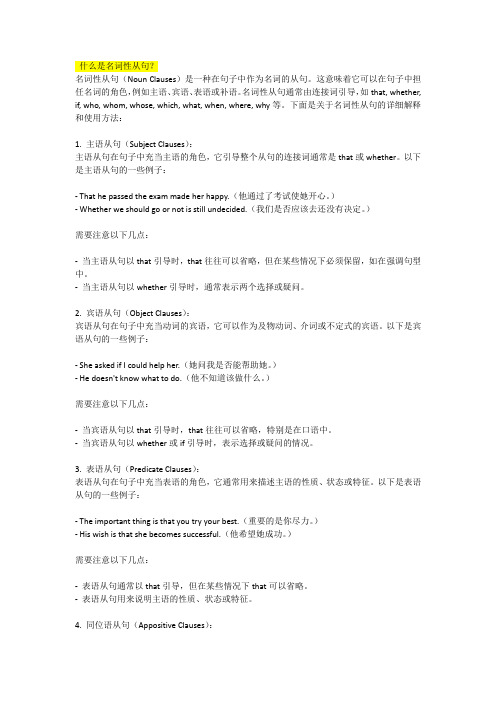
什么是名词性从句?名词性从句(Noun Clauses)是一种在句子中作为名词的从句。
这意味着它可以在句子中担任名词的角色,例如主语、宾语、表语或补语。
名词性从句通常由连接词引导,如that, whether, if, who, whom, whose, which, what, when, where, why等。
下面是关于名词性从句的详细解释和使用方法:1. 主语从句(Subject Clauses):主语从句在句子中充当主语的角色,它引导整个从句的连接词通常是that或whether。
以下是主语从句的一些例子:- That he passed the exam made her happy.(他通过了考试使她开心。
)- Whether we should go or not is still undecided.(我们是否应该去还没有决定。
)需要注意以下几点:-当主语从句以that引导时,that往往可以省略,但在某些情况下必须保留,如在强调句型中。
-当主语从句以whether引导时,通常表示两个选择或疑问。
2. 宾语从句(Object Clauses):宾语从句在句子中充当动词的宾语,它可以作为及物动词、介词或不定式的宾语。
以下是宾语从句的一些例子:- She asked if I could help her.(她问我是否能帮助她。
)- He doesn't know what to do.(他不知道该做什么。
)需要注意以下几点:-当宾语从句以that引导时,that往往可以省略,特别是在口语中。
-当宾语从句以whether或if引导时,表示选择或疑问的情况。
3. 表语从句(Predicate Clauses):表语从句在句子中充当表语的角色,它通常用来描述主语的性质、状态或特征。
以下是表语从句的一些例子:- The important thing is that you try your best.(重要的是你尽力。
名词性从句讲解
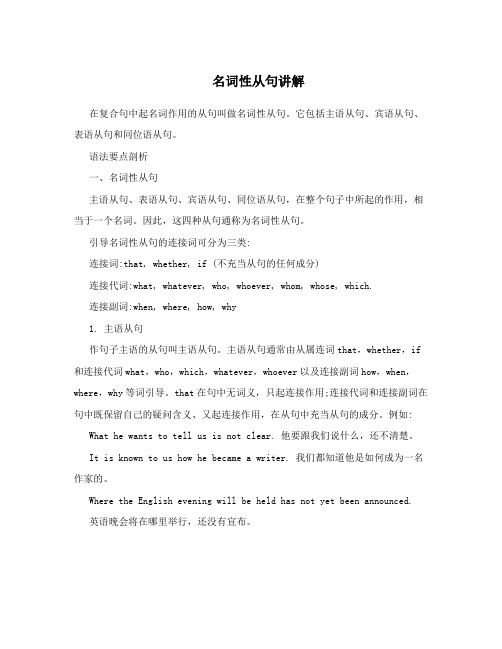
名词性从句讲解在复合句中起名词作用的从句叫做名词性从句。
它包括主语从句、宾语从句、表语从句和同位语从句。
语法要点剖析一、名词性从句主语从句、表语从句、宾语从句、同位语从句,在整个句子中所起的作用,相当于一个名词。
因此,这四种从句通称为名词性从句。
引导名词性从句的连接词可分为三类:连接词:that, whether, if (不充当从句的任何成分)连接代词:what, whatever, who, whoever, whom, whose, which.连接副词:when, where, how, why1. 主语从句作句子主语的从句叫主语从句。
主语从句通常由从属连词that,whether,if 和连接代词what,who,which,whatever,whoever以及连接副词how,when,where,why等词引导。
that在句中无词义,只起连接作用;连接代词和连接副词在句中既保留自己的疑问含义、又起连接作用,在从句中充当从句的成分。
例如: What he wants to tell us is not clear. 他要跟我们说什么,还不清楚。
It is known to us how he became a writer. 我们都知道他是如何成为一名作家的。
Where the English evening will be held has not yet been announced.英语晚会将在哪里举行,还没有宣布。
有时为避免句子头重脚轻,常用形式主语it代替主语从句作形式主语放于句首,而把主语从句置于句末。
主语从句后的谓语动词一般用单数形式。
常用句型如下:(1)It + be + 名词 + that从句 (2)It + be + 形容词 + that从句(3)It + be + 动词的过去分词 + that从句 (4)It + 不及物动词 + that 从句另注意在主语从句中用来表示惊奇、不相信、惋惜、理应如此等语气时,谓语动词要用虚拟语气“(should) +do”,常用的句型有:It is necessary (important, natural, strange, etc.) that …It is a pity (a shame, no wonder, etc.) that…It is suggested (requested, proposed, desired, etc.) that…2. 宾语从句名词句用作宾语的从句叫宾语从句。
【初中英语】名词性从句用法详解
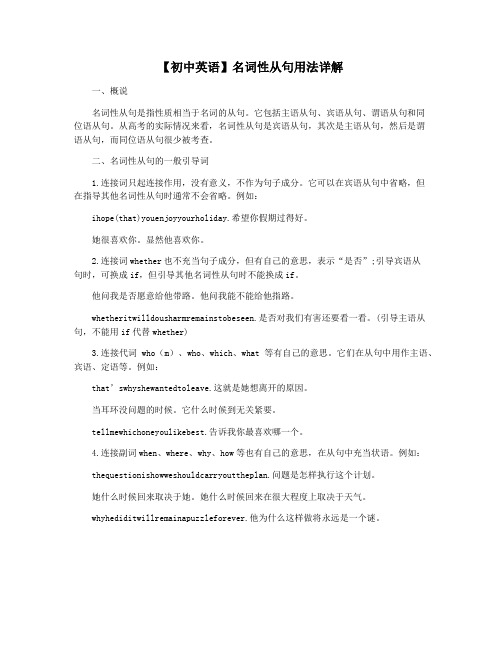
【初中英语】名词性从句用法详解一、概说名词性从句是指性质相当于名词的从句。
它包括主语从句、宾语从句、谓语从句和同位语从句。
从高考的实际情况来看,名词性从句是宾语从句,其次是主语从句,然后是谓语从句,而同位语从句很少被考查。
二、名词性从句的一般引导词1.连接词只起连接作用,没有意义,不作为句子成分。
它可以在宾语从句中省略,但在指导其他名词性从句时通常不会省略。
例如:ihope(that)youenjoyyourholiday.希望你假期过得好。
她很喜欢你。
显然他喜欢你。
2.连接词whether也不充当句子成分,但有自己的意思,表示“是否”;引导宾语从句时,可换成if,但引导其他名词性从句时不能换成if。
他问我是否愿意给他带路。
他问我能不能给他指路。
whetheritwilldousharmremainstobeseen.是否对我们有害还要看一看。
(引导主语从句,不能用if代替whether)3.连接代词who(m)、who、which、what等有自己的意思。
它们在从句中用作主语、宾语、定语等。
例如:that’swhyshewantedtoleave.这就是她想离开的原因。
当耳环没问题的时候。
它什么时候到无关紧要。
tellmewhichoneyoulikebest.告诉我你最喜欢哪一个。
4.连接副词when、where、why、how等也有自己的意思,在从句中充当状语。
例如:thequestionishowweshouldcarryouttheplan.问题是怎样执行这个计划。
她什么时候回来取决于她。
她什么时候回来在很大程度上取决于天气。
whyhediditwillremainapuzzleforever.他为什么这样做将永远是一个谜。
- 1、下载文档前请自行甄别文档内容的完整性,平台不提供额外的编辑、内容补充、找答案等附加服务。
- 2、"仅部分预览"的文档,不可在线预览部分如存在完整性等问题,可反馈申请退款(可完整预览的文档不适用该条件!)。
- 3、如文档侵犯您的权益,请联系客服反馈,我们会尽快为您处理(人工客服工作时间:9:00-18:30)。
第九讲名词性从句一、名词性从句的分类及其连接词1、名词性从句是复合句的一种,在句子中充当主语、表语、宾语或同位语。
名词性从句主要包括:1)________从句:what he said is true.2)________从句:This is what he said.3)________从句:I don’t understand what he said.4)________从句:We had no idea what he said.2、引导名词性从句的连接词有:what、which、that、who、whom、when、where、whether、if、why、because、how、whatever、whichever、whoever、whomever、whenever、wherever、however等二、各类名词性从句的基本用法1、主语从句:从句在整个复合句中充当主语eg. When the president will arrive is kept a secret.That she won the first place, delighted the whole family. (that 不能省略)注意:当谓语部分只有一两个词时,为了避免“头重脚轻”,经常使用形式主语it代替主语从句,而将主语从句放在后面。
eg. It is useful that we take part in after-school activities.It is a great pity that you haven’t read this novel before.2、表语从句:从句在整个复合句中充当表语eg. That is where we differ.That is why they left ahead of time.That is because he had lost his ticket.The problem is how we can raise so much money.3、宾语从句:从句在整个复合句中充当宾语eg. He said he had found a job.It depends on whether he can arrive on time.I’m afraid I can’t help you.4、同位语从句:从句在整个复合句中充当同位语在抽象名词fact、news、hope、thought、problem、possibility、suggestion、idea、desire等之后,通常用that引导同位语从句,对前面的名词起补充说明的作用,连接词that只起引导同位语从句的作用,在从句中不担当任何充分,不能省略。
eg. The news that our football team won the match made all of us excited.I have no idea why he came here.Word came that we would have to sit for an important exam next week.三、各类引导词的区别1、what与that的区别what在从句中可以作主语、表语或宾语that在从句中不作成分,只起连接作用,一般在从句中不缺少主语、表语或宾语时使用eg. What is needed is time.What we needed is time.I don’t know that he was seriously ill.That he has been better spreads over the country.另外,有时句子不缺成分时要用连接副词,使句子意思更加完整。
eg. The problem is how/whether/when/where we can get more money.2、whether和if的区别1)在______从句、_______从句、_______从句中,只能用whethereg. The question is whether he will be present at the meeting.Whether you can come will make a difference.I have no idea whether he will come to help us.2)在whether…or not与whether to do结构中均不能用if代替whethereg. Whether the singer can come or not is unknown yet.I have not decided whether to go or not.3)介词后接的宾语从句中用whether不用if (在动词后接的宾语从句中两者均可)eg. It depends on whether you can afford the time.I wonder whether/if you would like to join us in the outing this weekend.I’m not sure whether/if he will succeed.3、who与whoever的区别who在名词性从句中表示“谁”whoever(谓语用单数)= anyone who(谓语用单数)/ those who(谓语用复数)eg. I don’t know who he is.Give the dictionary to whoever needs it most.4、whoever与no matter who 的区别whoever可引导名词性从句,也可引导让步状语从句。
no matter who 只可引导让步状语从句。
eg. Whoever breaks the rule must be punished.Whoever you are, you must obey the rule.No matter who you are, you must obey the rule.5、从句中应用陈述句语序eg. Can you tell me where the nearest post office is?How can I get there?→Who can tell me _________________________________________________________?When will he come back?→Do you know ____________________________________________________________?6、当主句和从句的主语相同时,可以使用“连接词+ to do”结构eg. I wondered what to do next(what I should do next).We are not sure when we will set out.→We are not sure _________________.Practice:1.Calling us calmly together, he made an urgent announcement _______ we must save onlyessential supplies before the ship sank….2.The car stopped just behind me, the door opened and a man got out, who said anxiously,“Have you any idea ______ we can get petrol at this time of night? We’ve just ran out of it completely.”3.However, ______ bothered them most was that many people stared at them….4.The peasant learned ______ many others never understood:“Every obstacle presents anopportunity to improve one’s condition.”5.I have been thinking. I know how valuable this stone is, but I give it back to you in the hope_____ you can give something much more precious.6.______ leaves the room last ought to turn off the lights. Please keep it in mind.7.In the first place, it often happens _____ we have trouble finding appropriate words andphrases to give expression to our mind.8.This museum is not _____ it was ten years ago. It takes on a new look now.9.She dresses well, but the trouble is _____ the clothes she is wearing don’t go with each othervery well.10.The suggestion ______ students should learn some practical knowledge is worth considering.11.______ knowledge comes from practice is known to all.12.It has not been decided yet ______ the meeting will start at the hall or not.13.Elwyn Brooks White, known as E.B.White, has warmed many hearts with his classicchildren’s tales…His parents loved kids—that’s probably ______ his passion for writing children’s books came from..14.The question is ______ the film is worth seeing.15.The reason for his success is ______ he worked hard.16.Perseverance is a kind of quality—that’s _______ it takes to do anything well.17.The chance ______ he will attend the meeting is very little.18.—Do you know the real cause of his absence.—It was _____ he overslept in the morning.19.He promised he ________(attend) the meeting the next morning.20.The moment she saw us, she told us the good news that she ______ (pass) the exam and wasgoing to celebrate it in the evening.。
